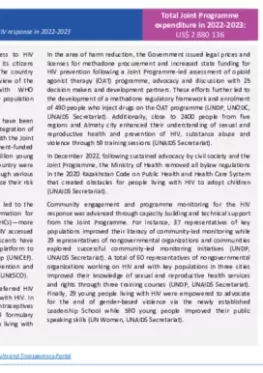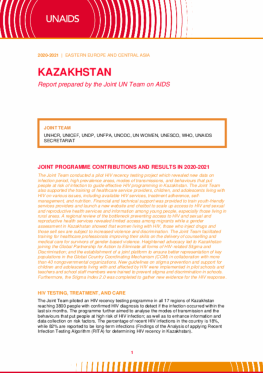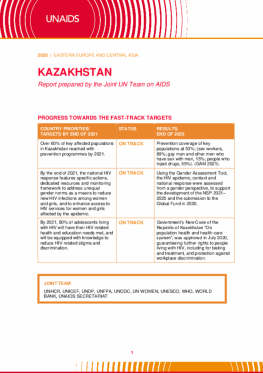|
Kazakhstan
Kazakhstan took considerable strides in improving access to HIV prevention, testing and harm reduction programmes for its citizens through strategic support from the Joint Programme. The country achieved universal access to HIV testing following the review of the national HIV testing guidelines and alignment with WHO recommendations—over three million people, including key population in Kazakhstan subsequently accessed testing for HIV (WHO).
Pre-exposure prophylaxis (PrEP) services and information have been scaled up for young people and key populations with the integration of PrEP into the national clinical protocols and collaboration with the Joint Programme. Hence, close to 5000 people accessed government-funded PrEP in 2023 compared to 15 in 2020. More than 1.5 million young people, predominantly from key populations across the country were also sensitized on pre- and post-exposure prophylaxis through various campaigns and were encouraged to order free PrEP to reduce their risk of acquiring HIV (UNFPA, UNAIDS Secretariat).
Intense advocacy and support from the Joint Programme led to the introduction of online integrated HIV services and information for adolescent and young people within Youth Heath Centres (YHCs)—more than 3000 adolescents, including adolescents living with HIV accessed these online services in 30 YHCs (UNICEF, UNFPA). Adolescents have been included in the national primary healthcare digital platform to enhance monitoring and service coverage among this group (UNICEF). Close to 10 000 adolescents were sensitized on HIV prevention and available services through a national social media campaign (UNESCO).
Kazakhstan included dolutegravir-based regimen as the preferred HIV treatment to improve the health outcome of people living with HIV. In 2023, the Government added emergency and hormonal contraceptives and intrauterine devices in the national pharmaceutical formulary enabling vulnerable and key populations, including women living with HIV to access them free of charge (UNFPA).
In the area of harm reduction, the Government issued legal prices and licenses for methadone procurement and increased state funding for HIV prevention following a Joint Programme-led assessment of opioid agonist therapy (OAT) programme, advocacy and discussion with 25 decision makers and development partners. These efforts further led to the development of a methadone regulatory framework and enrolment of 490 people who inject drugs on the OAT programme (UNDP, UNODC, UNAIDS Secretariat). Additionally, close to 2400 people from five regions and Almaty city enhanced their understanding of sexual and reproductive health and prevention of HIV, substance abuse and violence through 59 training sessions (UNAIDS Secretariat).
In December 2022, following sustained advocacy by civil society and the Joint Programme, the Ministry of Health removed all bylaw regulations in the 2020 Kazakhstan Code on Public Health and Health Care System that created obstacles for people living with HIV to adopt children (UNAIDS Secretariat).
Community engagement and programme monitoring for the HIV response was advanced through capacity building and technical support from the Joint Programme. For instance, 37 representatives of key populations improved their literacy of community-led monitoring while 29 representatives of nongovernmental organizations and communities explored successful community-led monitoring initiatives (UNDP, UNAIDS Secretariat). A total of 60 representatives of nongovernmental organizations working on HIV and with key populations in three cities improved their knowledge of sexual and reproductive health services and rights through three training courses (UNDP, UNAIDS Secretariat). Finally, 29 young people living with HIV were empowered to advocate for the end of gender-based violence via the newly established Leadership School while 590 young people improved their public speaking skills (UN Women, UNAIDS Secretariat).





